Tired of cleaning your small gun parts by hand? Or tumbling brass cases for hours?
It could be time to upgrade to an ultrasonic cleaner.
I head-to-head test the two main options for the firearm market…the Lyman 2.5L Turbo Sonic Cleaner and the Hornady 2L Lock-N-Load Sonic Cleaner.
Prices accurate at time of writing
Prices accurate at time of writing
-
25% off all OAKLEY products - OAKLEY25
Copied! Visit Merchant
Prices accurate at time of writing
Prices accurate at time of writing
-
25% off all OAKLEY products - OAKLEY25
Copied! Visit Merchant
I clean some spent casings first and then also some stubborn (and super dirty) pistol barrels and BCGs.
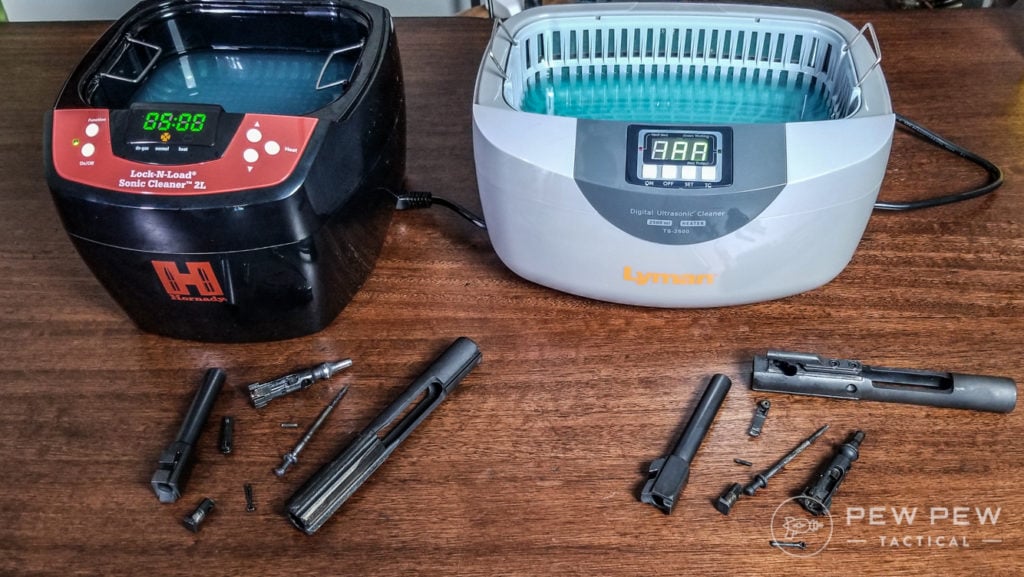
By the end you’ll know if ultrasonic cleaners are for you. And if they are…the best model for your specific needs.
Who Are Ultrasonic Cleaners For?
Most likely not for beginners in the reloading or gun cleaning world.
If you’re just starting to reload (Reloading for Beginners), go with dry tumbling like the Frankford Arsenal Kit.
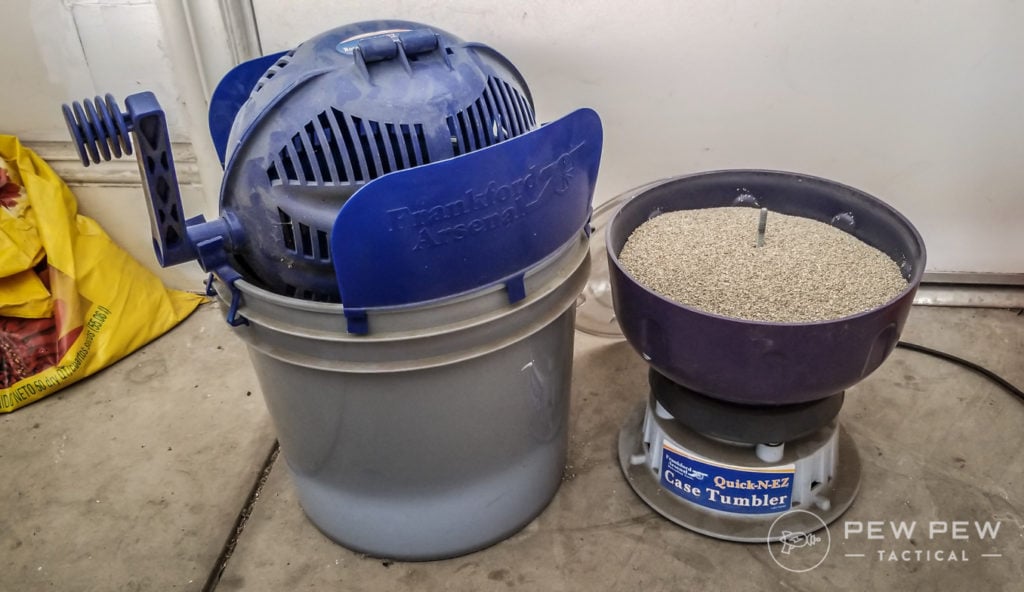
It takes a couple hours, is kind of noisy, and you probably want to hold your breath as you use the bingo machine separator.
Prices accurate at time of writing
Prices accurate at time of writing
-
25% off all OAKLEY products - OAKLEY25
Copied! Visit Merchant
But it’s great for capacity and gives you decently clean brass.
Ultrasonic cleaning is when you are looking for meticulously clean brass in smaller quantities.
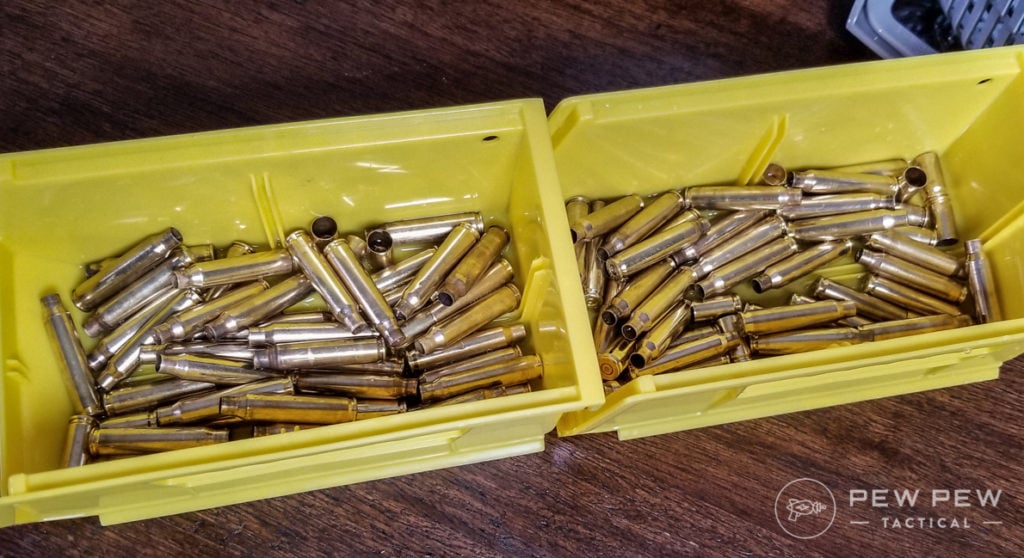
Or you don’t want to deal with the extended noise and potentially airborne lead particles.
How about you gun cleaners out there?
If you’re new…check out our 4 Best Gun Cleaning Kits.
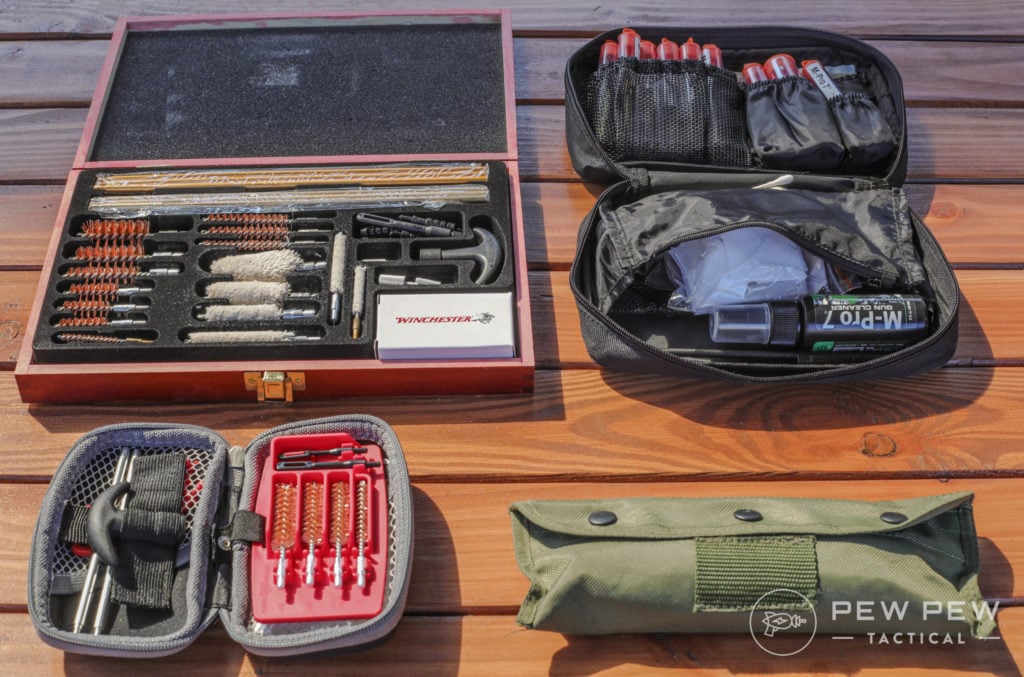
It’s a great place to start and even if you go the ultrasonic route…you probably still need a decent cleaning kit.
But…ultrasonic cleaners do let you have some sort of “set it and forget it” aspect.
And thanks to the creation of millions of tiny bubbles per second…ultrasonic cleaners can clean even the smallest of spaces your Q-Tip can’t reach.
Still sound good?
Ultrasonic Brass Case Cleaning
First up…let’s pit the Lyman and Hornady Ultrasonic cleaners against each other in cleaning up range brass.
I chose 40 once-fired .223 casings and 10 9mm casings. All from the same range session, same ammo lot, and same gun.
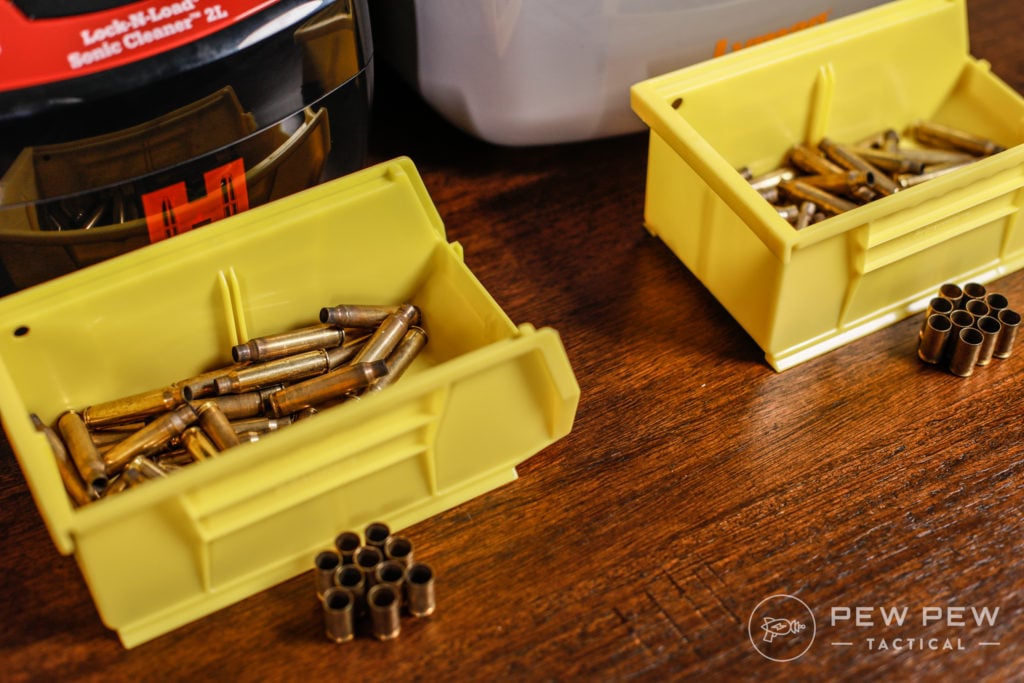
And chose Lyman Sonic Case Cleaner (make sure it’s not for dry tumbling).
I combined 40 oz of distilled water with 2 oz of the case cleaner in each, following their recipe for medium to heavy duty jobs.
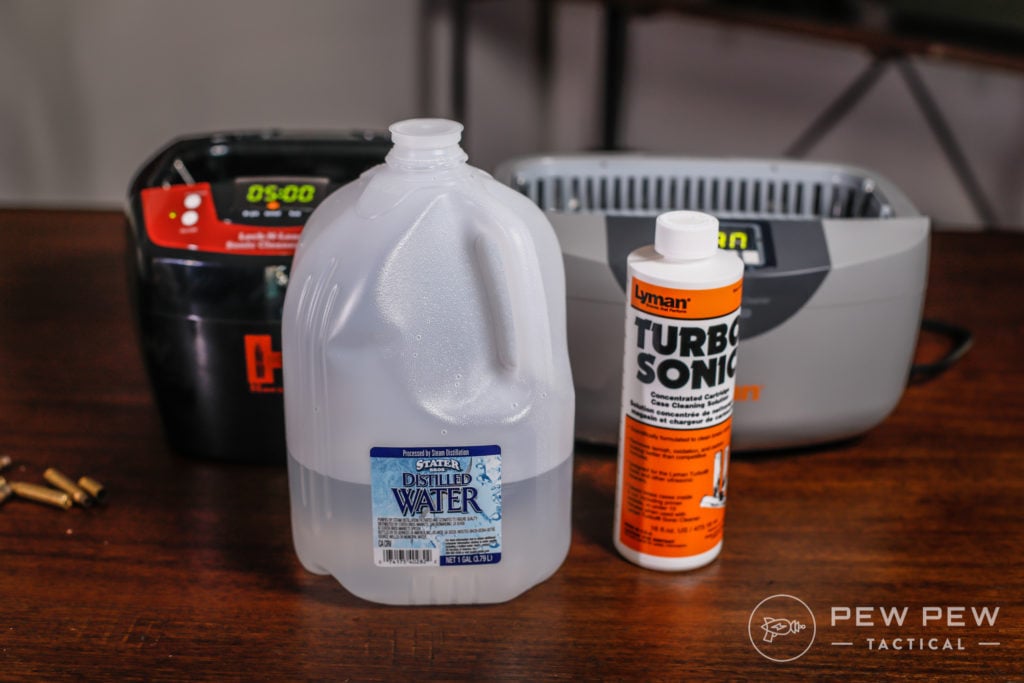
You want to use distilled as much as possible since tap water can have a lot of soluble particles that stain or corrode your brass afterwards.
Both models have heating features that bring the solution to around 150 degrees. It took about the same 40 minutes for each.
I also shook the trays as much as possible to get air out of the casings.
First off…it’s pretty loud and annoying if you don’t use the cover. Check out a quick video of me turning them both on (warning: loud buzzing sounds).
With the cover it’s much more manageable…but I still wouldn’t want to be in the same room doing work requiring concentration.
All in all…pretty anti-climactic. Some buzzing sounds and steam from the heat. No crazy bubbles consuming everything (darn).
As for time?
I chose a total amount of 24 minutes cleaning based on my research. I could easily set it on the Hornady but for the larger Lyman the max was 8 minutes (480 seconds).
So I took that opportunity of resetting the Lyman every 8 minutes to do snapshots of the process.
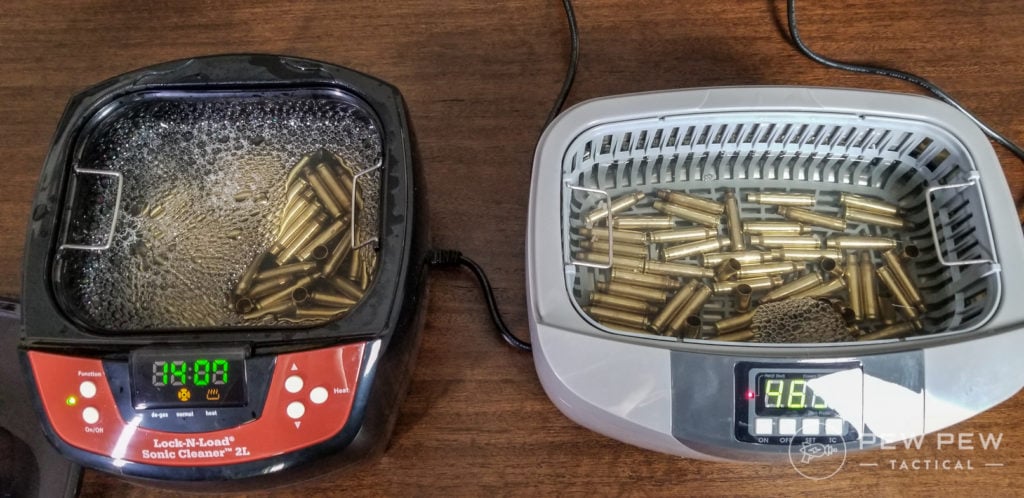
A little dirtier in both…but much more easily seen in the Lyman since it’s a lighter plastic color.
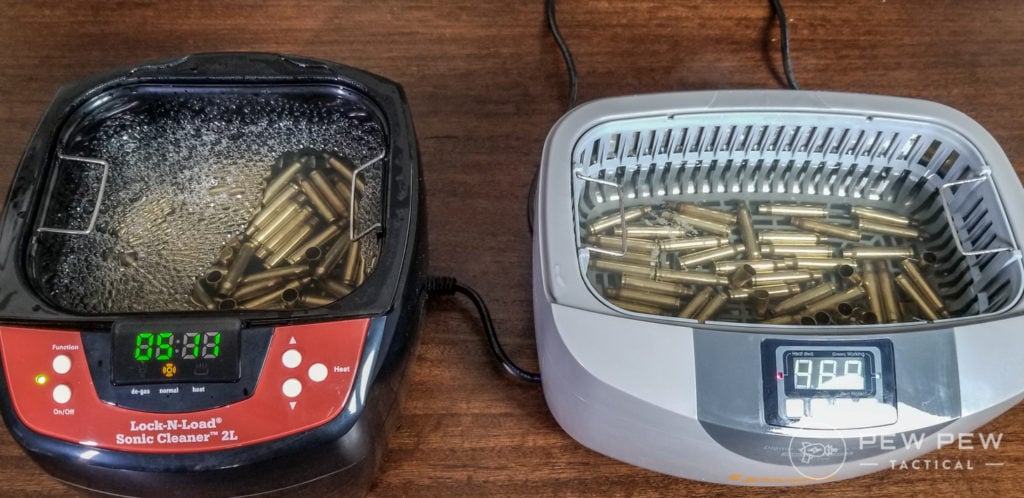
Some more at ~16 minutes.
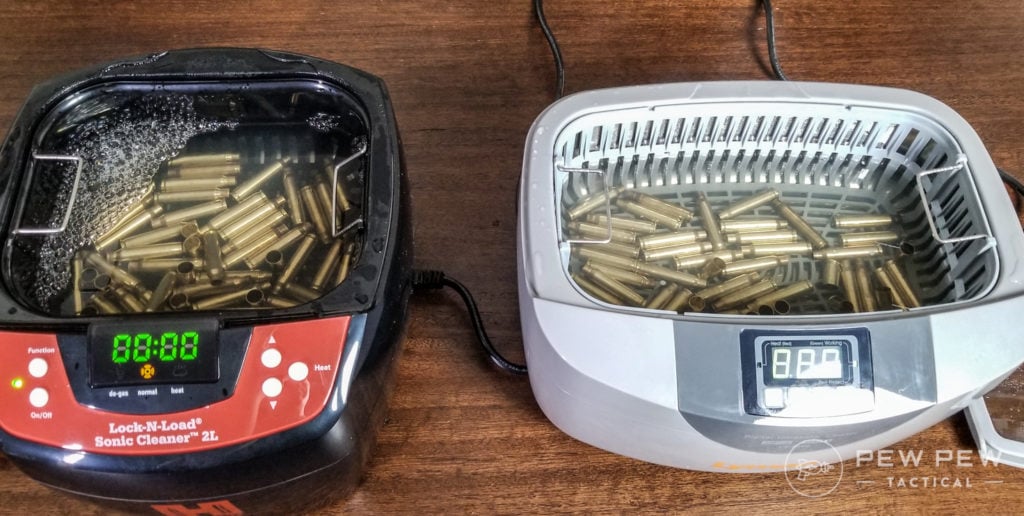
And at the finished 24 minutes you can see some ever more slight dirt discoloration in the liquid.
Here’s how it is with everything removed.
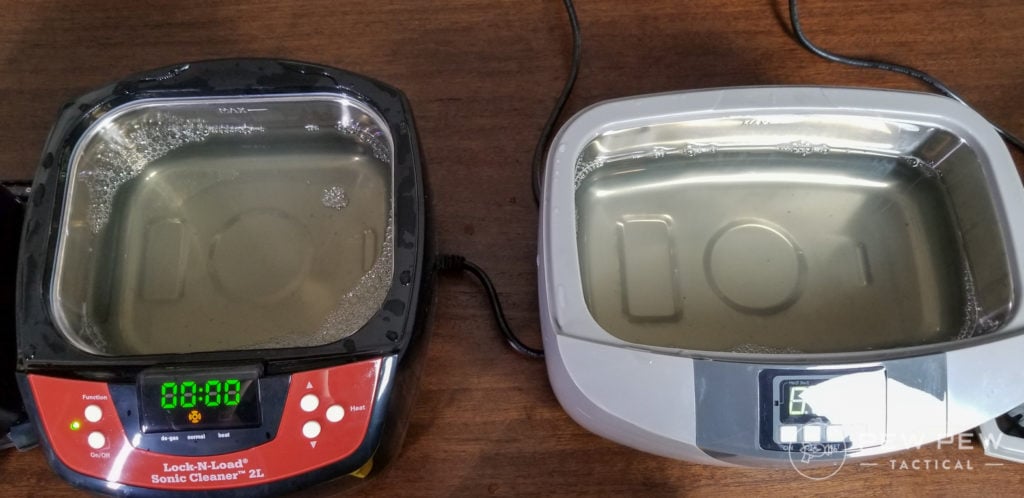
Yum.
Now let’s see the results after I rinsed with some distilled water…

The .223 casings were very clean except for some necks…but very comparable to around 3 hours of dry tumbling for me.
Let’s look at the 9mm casings since you can get a peek all the way down in there…
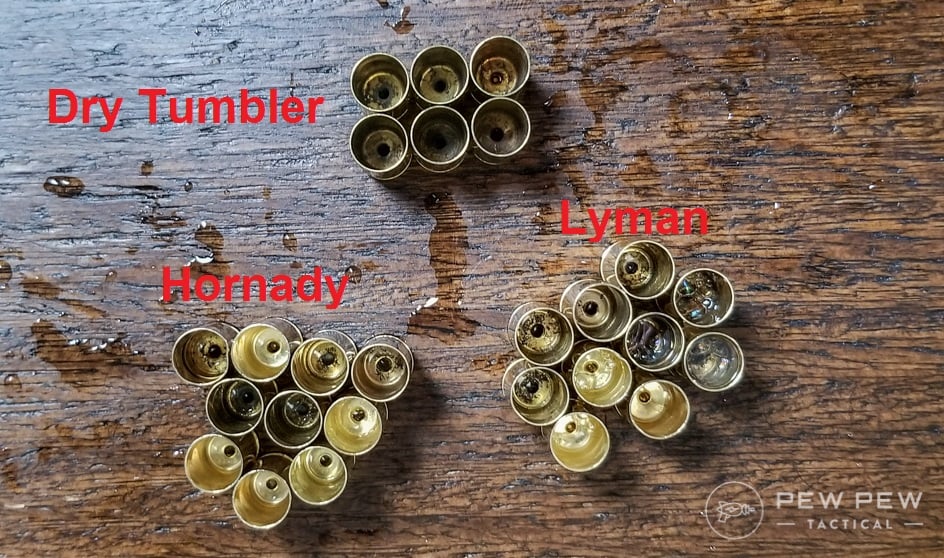
Outside is comparable…like the .223, but it’s the inside where ultrasonic cleaning “shines.”
I’m still getting used to ultrasonic cleaning so one big tip is to make sure all the air is gone from the casings. Otherwise you end up with a hodgepodge of super-clean and dirty interiors like above.
I’m going to give both the Hornady and Lyman a tie since when they are clean…they are very clean.
And before you veteran reloaders screech…I tend not to remove spent primers before cleaning casings intended for plinking.
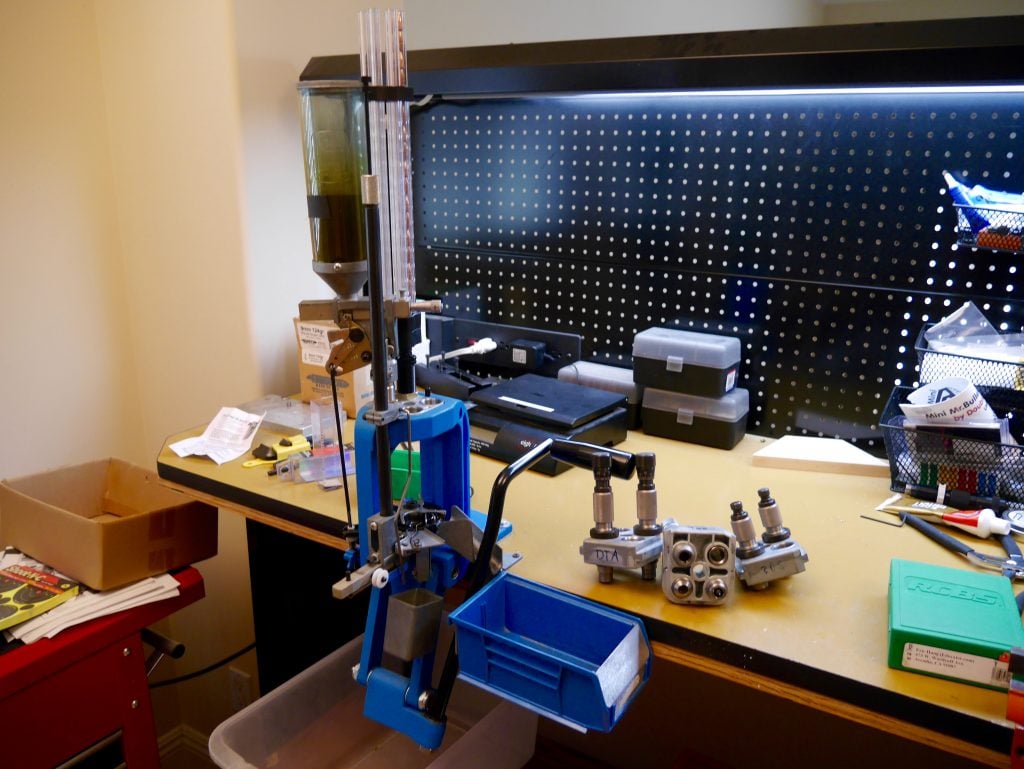
Putting dirty casings into my progressive reloading press (check out my favorite ones) can scratch up the dies. And I’m too lazy to use a single stage press with a universal decapping die for plinking ammo.
But if you decap…get ready for some super clean primer pockets!
Now…let’s see how the cleaners fare with gun parts!
Ultrasonic Cleaning Gun Parts
Does using the Lyman or Hornady cut down on stinky cleaners, dirty hands, and tons of time?

I chose two comparatively same round-count BCGs and two Glock Barrels. And tossed a quarter to see which went where.
Here’s the Lyman…
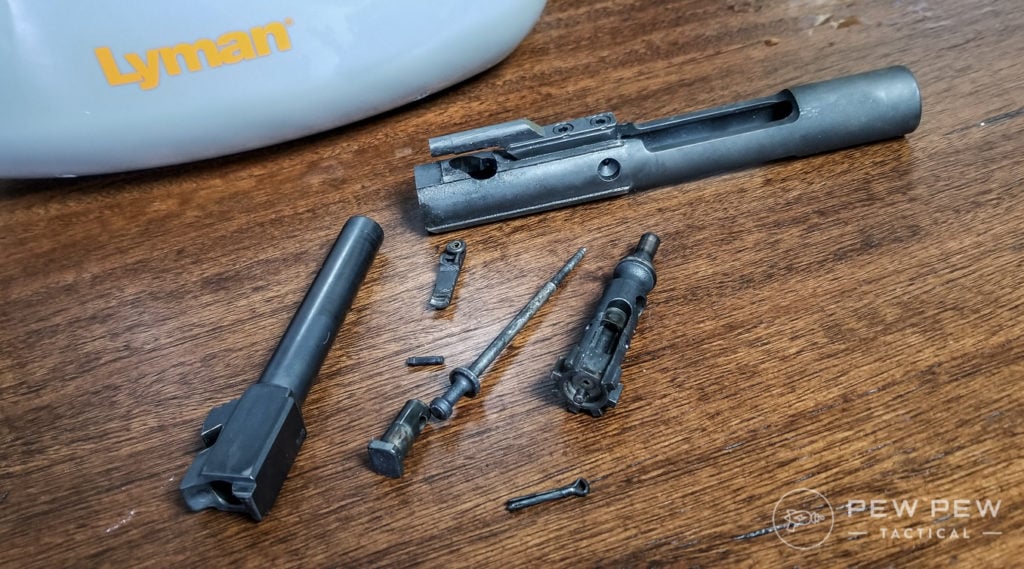
Here’s the Hornady…
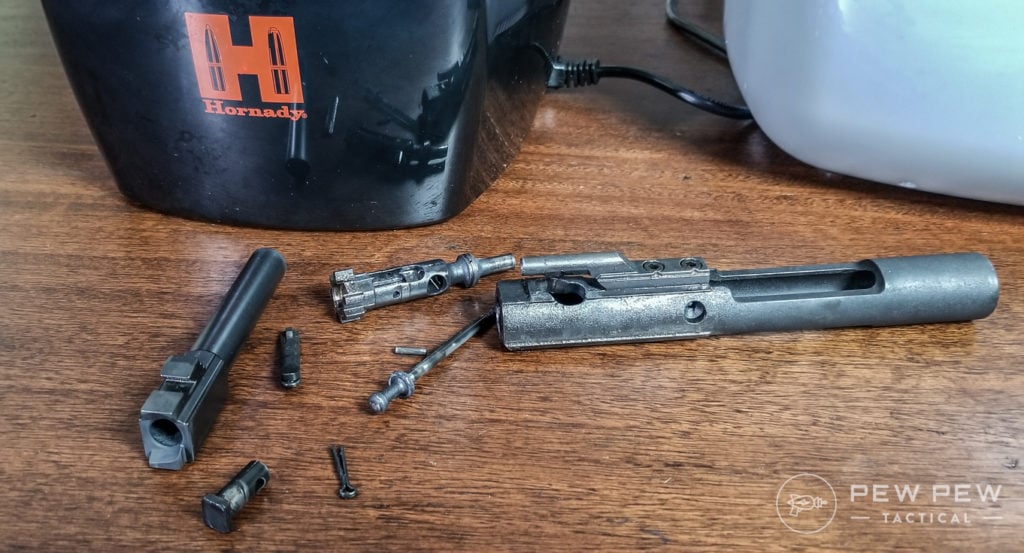
Let’s take a closer look at the barrels…yes, the right sided Lyman one is much dirtier.
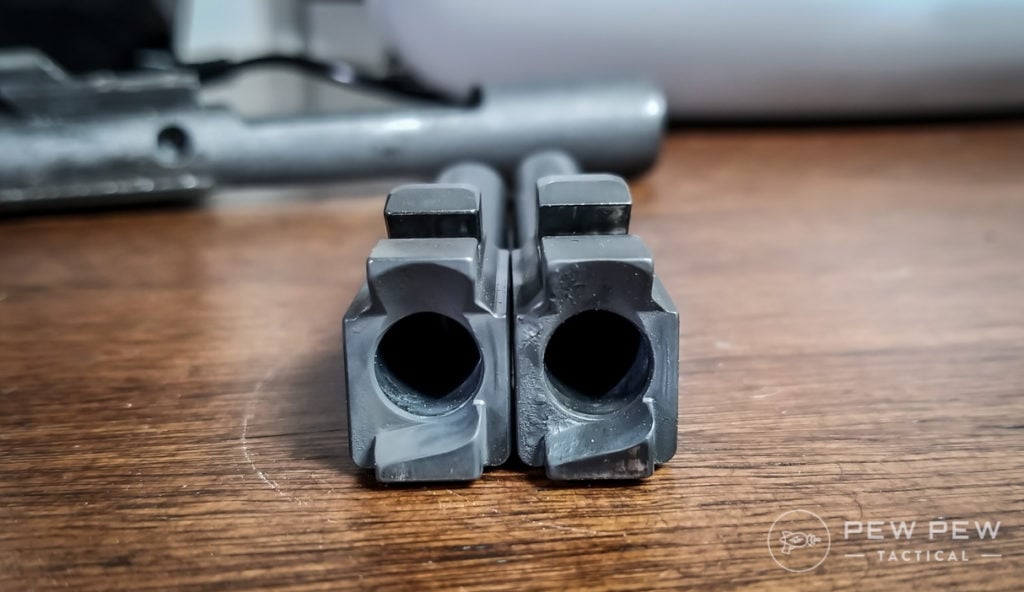
And the bolts of the BCGs…especially the carbon buildup areas. Pretty even chunks near the gas rings.
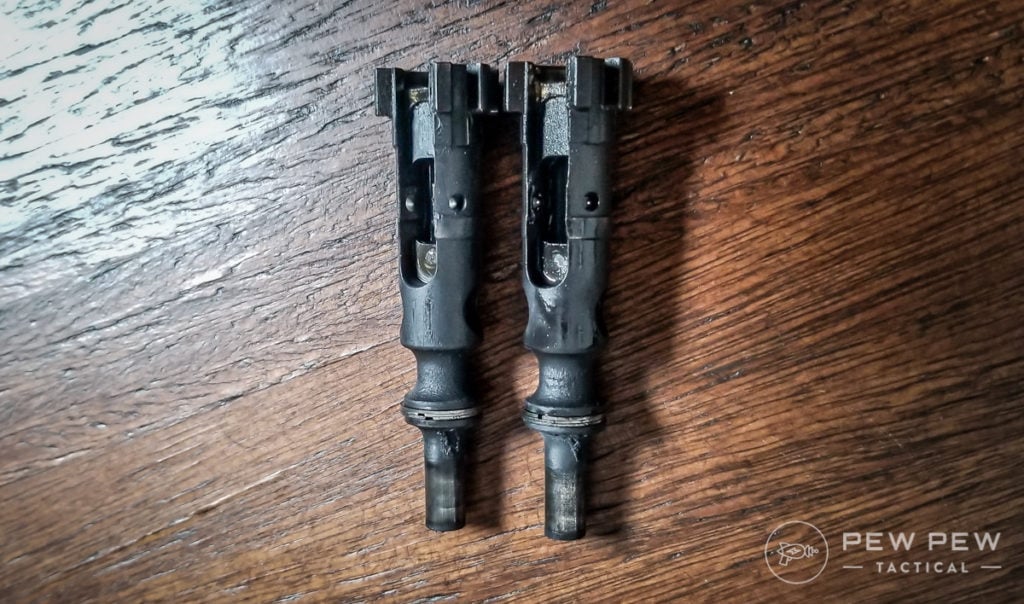
Same procedure, I used 40 oz of distilled water and 2 oz of Lyman Sonic gun parts cleaner (note the blue color).
I let everything warm up for 40 minutes and set the Hornady to 24 minutes and the Lyman to 480 seconds.
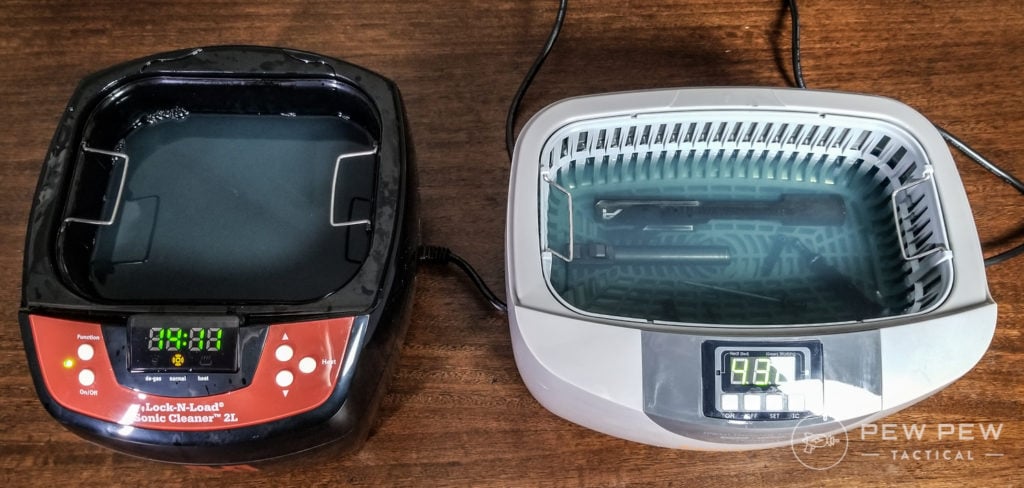
You can already see a lot of gunk getting into the liquid.
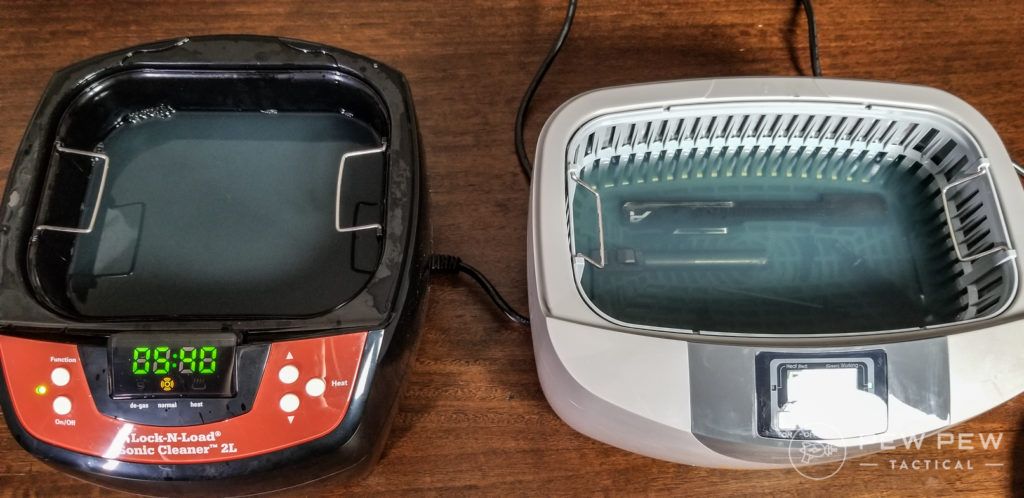
With more at the 16 minute mark.
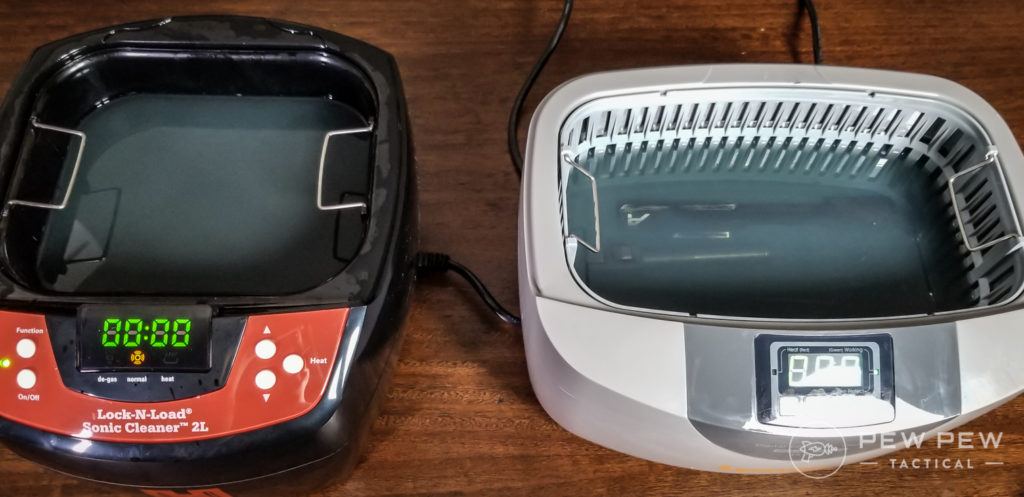
And even more at the finish of 24 minutes.
How clean did the parts get?
Remarkably clean for me simply breaking down the parts and dropping them in…
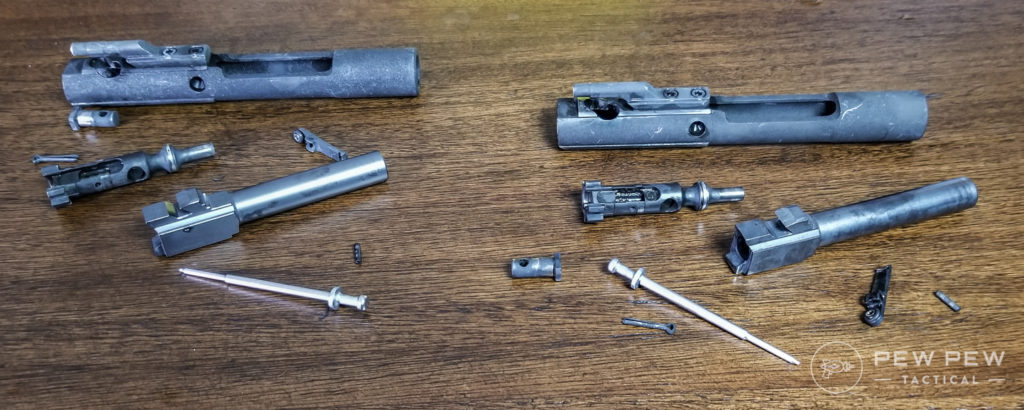
Let’s start with the BCG bolts…the carbon is almost completely off of both bolts. And that’s the stubborn kind that I usually need to scrub/scrape away!
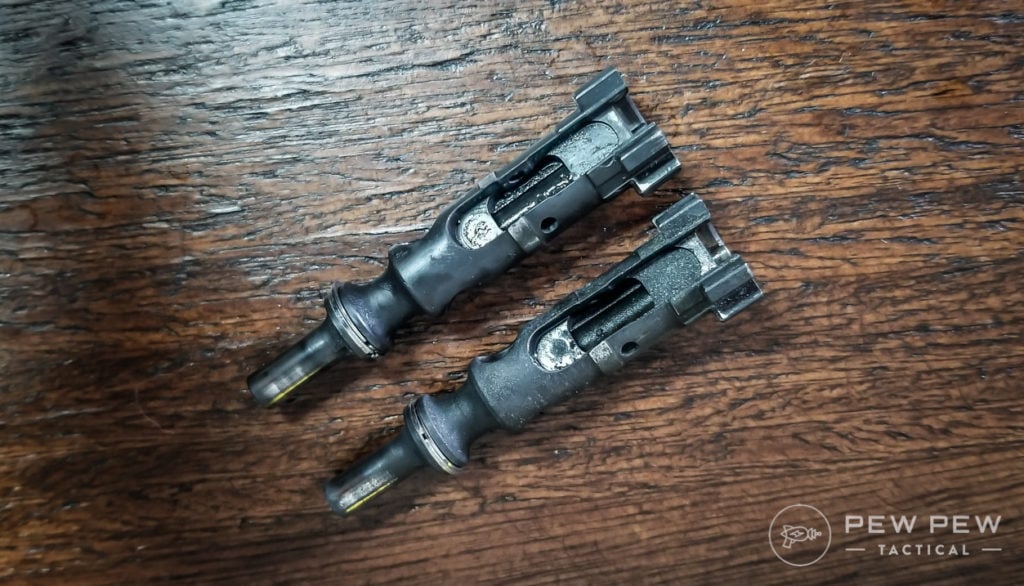
Here’s a closeup of the barrel…
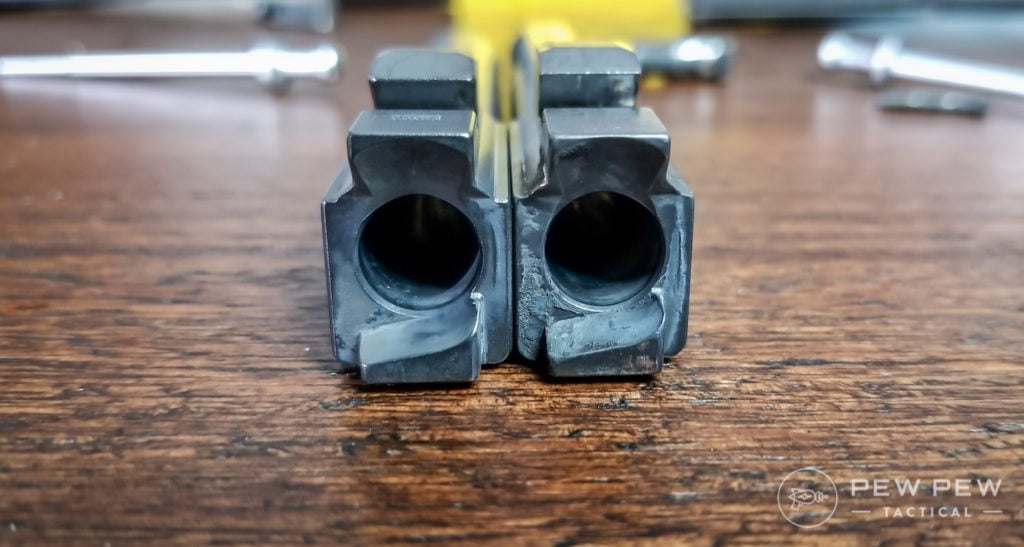
The dirtier one in the Lyman is about half cleaned. It started off much dirtier and would probably fare better with a little more time.
Normal dirty parts like the firing pings cleaned up really easily, with only a little bit of residue at the bottom of the “thumbtack” area that was wiped away when drying.
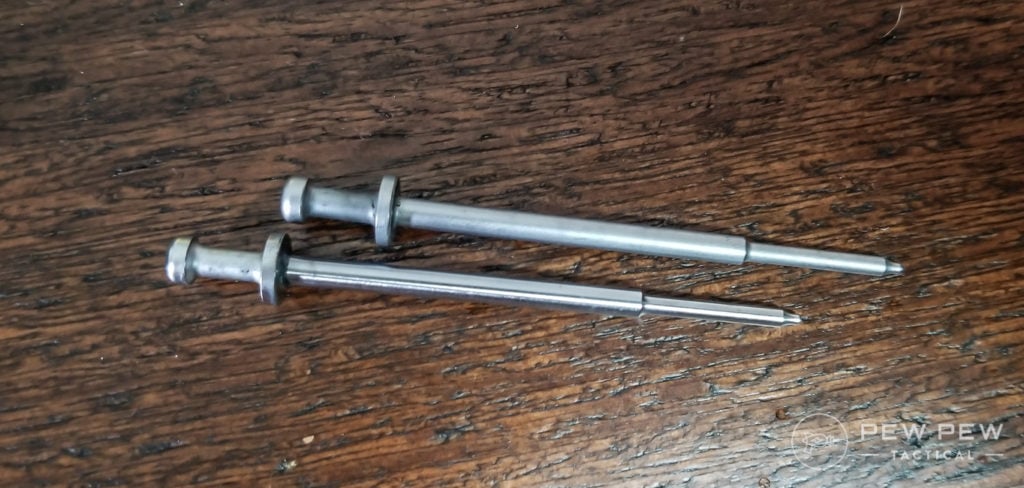
Speaking of drying…make sure you use some compressed air or a hairdryer after rinsing off the dirty soap juice with some distilled water.
This is where having a brass dryer like the Frankford Armory one would have helped a lot.
Prices accurate at time of writing
Prices accurate at time of writing
-
25% off all OAKLEY products - OAKLEY25
Copied! Visit Merchant
I lubed all the parts together with my favorite gun oil…and voila!
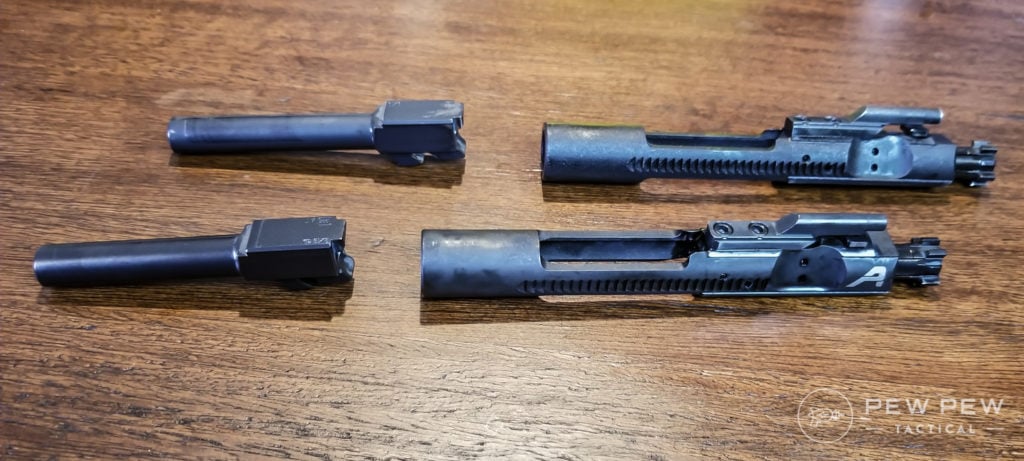
Good as new.
Note: I’ve read that you shouldn’t put in aluminum gun parts since ultrasonic cleaners might cause microscopic cavities in the metal. And many people are fine popping in polymer frames…but I’m not at the moment.
Now…let’s get into the nitty gritty of each ultrasonic cleaner to see which is the best for you.
Things to Consider
So which is the best? Lyman or Hornady?
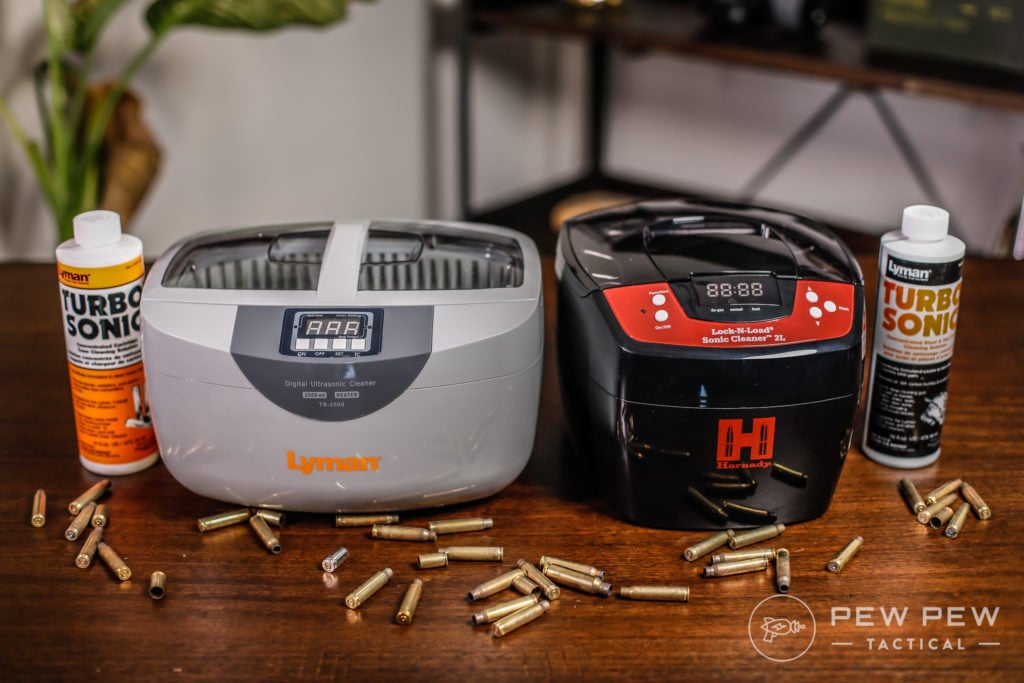
Capacity
If you’re cleaning a lot of brass, the Lyman gets the win by default since it is 2.5L compared to the Hornady’s 2L.
Descriptions list the Lyman at 900 9mm cases and the Hornady at 300 .223 or 150 .308 cases. Thanks non-exchangeable units!
Winner: Lyman
Heating
Both reached about the same temperature (with my scientific finger test) in about the same time of 40 minutes. Of course it will vary with your distilled water temperature and elevation.
Draw
Settings
The Hornady lets you set cleaning times in increments of 5 minutes, and then finessing the time by pressing the down key.
Example: 5, 10, 15, 20, 25, 24 for the tested routine.
The Lyman only lets you max out at 480 seconds at a time. Ok if you’re cleaning jewelry…but sucks when you are cleaning brass or stubborn gun parts.
Winner: Hornady
Cleanliness
Both cleaned the brass very well (as long as I correctly submersed the brass completely).

The Lyman got the wrong end of the coin toss with the dirtier barrel. But I think with more time it would have been fine.
BCGs were cleaned equally.

Draw
Other Features
The Hornady gives you a “de-gas” feature which is more useful in a science lab than part/brass cleaning. It’s not for getting rid of the big air bubbles in your brass.
The Lyman has a slightly smaller slotted basket so your tiny parts don’t go missing. But neither were small enough for the bolt extractor pin.
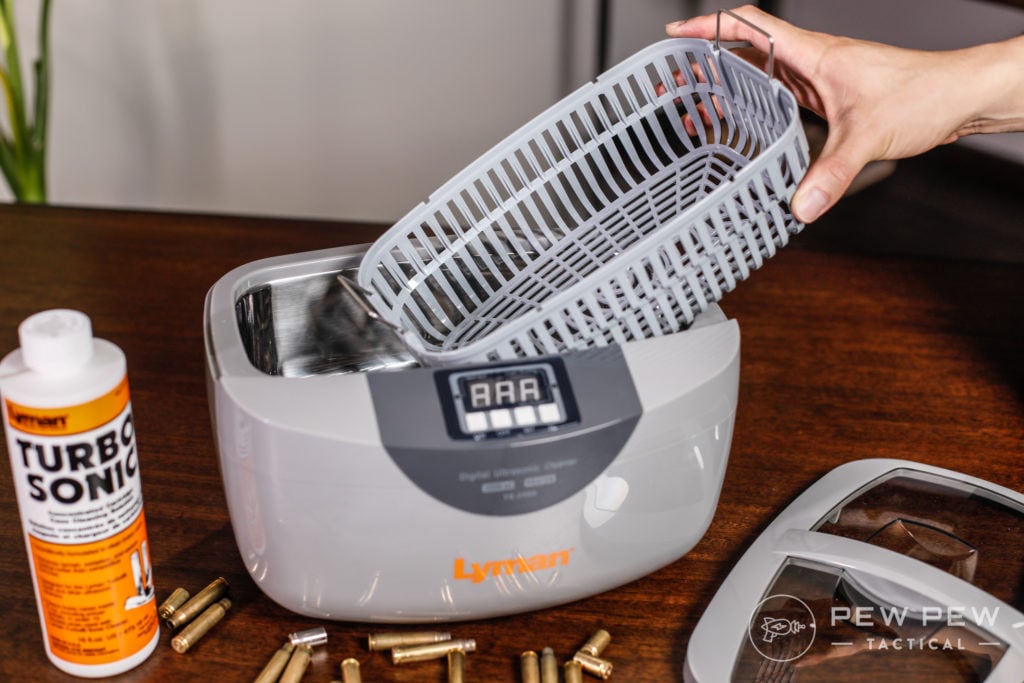
Draw
Price
As of writing, the Lyman was $99 and the Hornady at $109.
Winner: Lyman
Best Ultrasonic Gun & Case Cleaner
If I had to choose one…
Lyman Turbo Sonic Case Cleaner
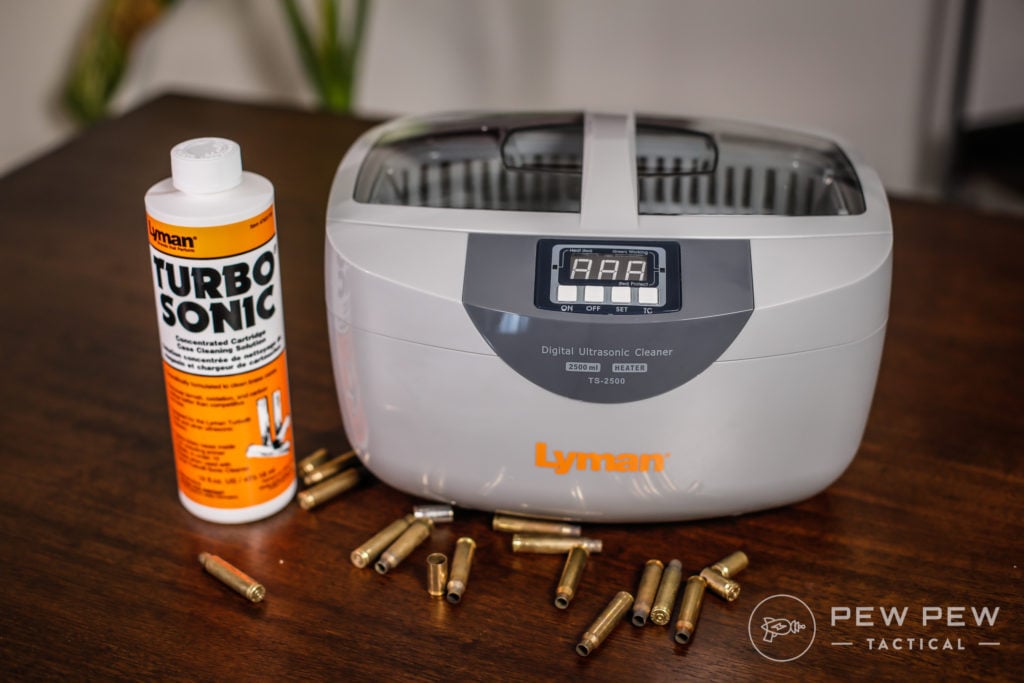
I would choose the Lyman since it’s slightly cheaper and has a larger capacity. And I like to wait until I have a lot of brass to clean.
Prices accurate at time of writing
Prices accurate at time of writing
-
25% off all OAKLEY products - OAKLEY25
Copied! Visit Merchant
BUT…
It’s inability to go above 8 minutes of cleaning time without checking in and resetting kills it.
Hornady Lock-N-Load Sonic Cleaner II
I’m looking for a set it and forget it method where I can leave the room and avoid the buzzing sound.
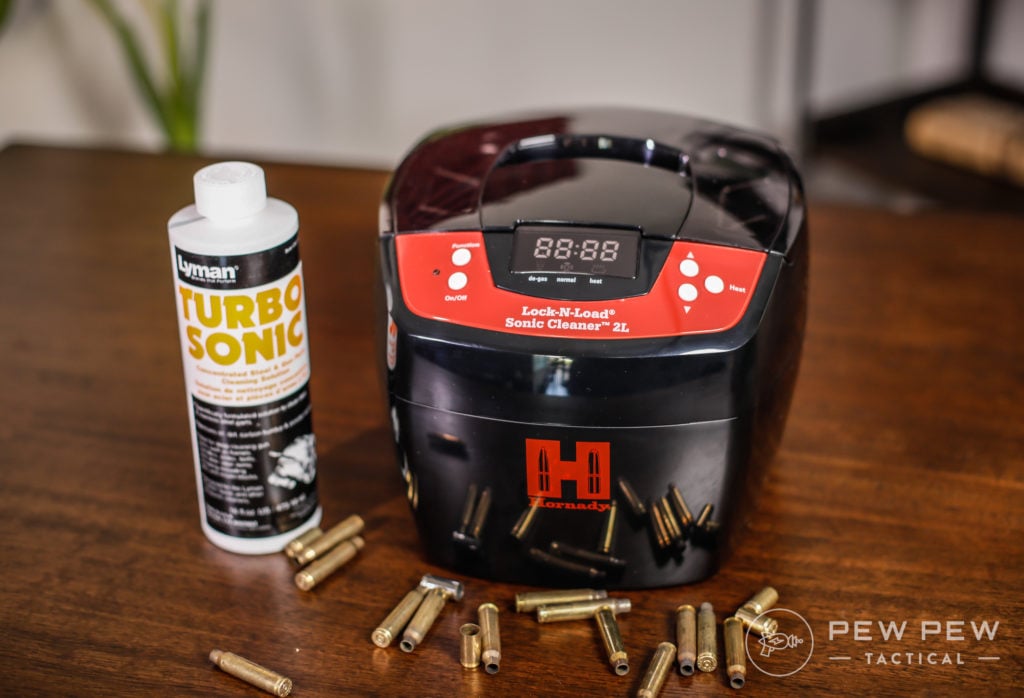
So I’ve got to give it to Hornady even though it’s a few bucks more and slightly reduced in volume.
Prices accurate at time of writing
Prices accurate at time of writing
-
25% off all OAKLEY products - OAKLEY25
Copied! Visit Merchant
Conclusion
After all this…are ultrasonic cleaners for you?

If you want your brass to be super clean with minimal time and effort compared to dry-tumbling…yes.
If you want to set it and forget it for gun parts…yes.
Again, my personal recommendation is the Hornady because of the timing issue with the Lyman.
If you do go with ultrasonic cleaning…make sure you grab the other essentials.

- Distilled Water
- Lyman Sonic Case Solution
- Lyman Sonic Gun Parts Solution
- Frankford Arsenal Case Dryer
I’m pretty new to the world of ultrasonic cleaners. Any tips for our fellow beginners from you veteran brass cleaners? Also check out our Best Places to Buy Reloading Components and Beginner’s Guide to Reloading.

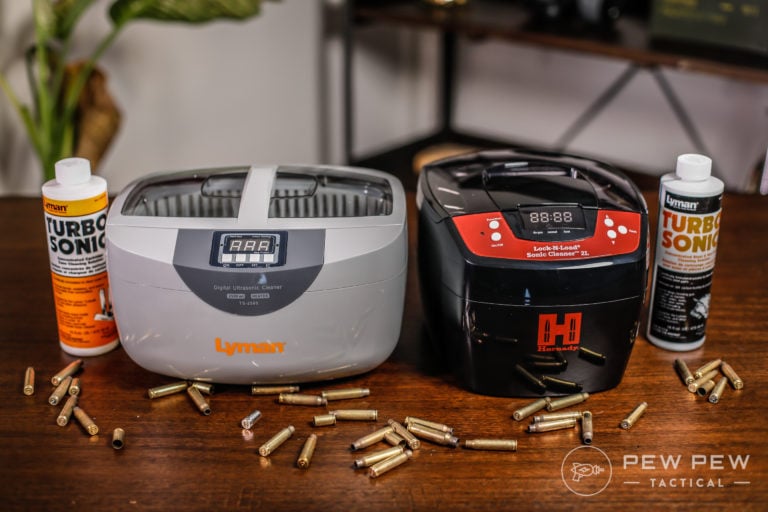
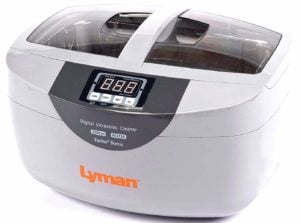
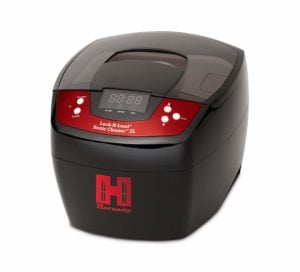
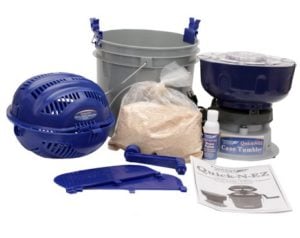
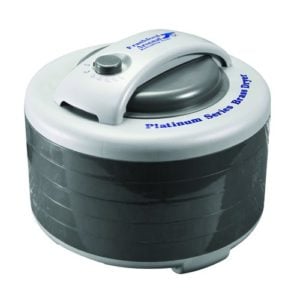







18 Leave a Reply
Okay, How about user serviceable suppressor parts? How about a test for that? Do you think these guys are good enough or do we get into bigger commercial units? I bet there are a bunch of folks who would like your opinion. That's why I looked here first. Keep up the good work!
I can’t believe no one has mentioned how dirty those BCG parts are after the ultrasonic cleaning. Shell cases, totally different story but in all honesty if you’re that lazy to clean your own weapon… You shouldn’t be shooting, go join the Girl Scouts or brownies. If you got rid of the pictures and comments for the BCG Items… This would be a half decent article, as it stands, it’s useless. Are you getting paid by Hornady or Lyman?
With all your extensive “ soaking up as much information as possible online” Hung, you should take a course on integrity or honesty before you continue to write these useless articles.
If I were only cleaning gun parts and not brass, do I really need to use distilled water?
I kind of feel like you left out one important step: the water is fouled with a ton of lead, and shouldn't be poured down the drain. I keep a 5 gallon jug and empty it into that and dispose of it properly whenever it gets ~2/3 full.
Try Simple Green and I'll bet your BCGs come out sparkling. Oil everything immediately after cleaning to prevent rust. Simple Green will strip off everything.
I already had an ultrasonic cleaner for jewelry and eyeglasses. Search for "2.5 liter ultrasonic cleaner" on Amazon and you will find numerous cleaners identical to the Lyman except for the branding. All of them are ~US$20 to ~US$30 cheaper than the Lyman. Change your search to "2 liter ultrasonic cleaner" and you will find several identical to the Hornady cleaner that are also cheaper. I think they are all made in the same factory in the PRC and imported with different color schemes. Not long ago, I bought a couple of used Glock 17s that were filthy. I disassembled both down to the last pin and spring and ran them through the ultrasonic cleaner using a 1:10 mixture of Simple Green and tap water. I had to do the frame separately from the other parts. After two 8-minute cycles, the mixture turned from green to black. I rinsed the parts and blew them dry with compressed air. The Simple Green stripped away all grease and oil. I sprayed everything down with Break Free. After that, I was able to examine the parts for wear, replace a few springs and the extractor depressor plungers, and I had two apparently brand-new Glock 17s. I also cleaned the barrels with brush and solvent in the usual way. I don't reload, so I have not tested the cleaner on brass, but it worked amazingly well on the Glocks, probably due to the Simple Green. My ultrasonic cleaner was a luxury that has become a necessity.
I bought the Lyman and love it. I shoot a lot of blackpowder cartridge, which creates lots of crud. I found that a test tube drying rack (bunch of plastic pins in a board) holds the cases, lets the air go up and the crud fall out. You can then rinse and dry easily as well.
Use a wet tumbler with stainless steel pins. The only way to get things real clean. Primer pockets especially.
My Franklin arsenal rotary tumbler is better than the vibratory or the ultrasonic I bought. I returned the ultrasonic the same day I bought it.
Grab your cake and eat it too! Overcome the timer limitations of the Lyman by going with the Isonic industrial ultrasonic cleaner. It's essentially the same unit as the Lyman (suspect that Lyman's made by them or both by a common 3rd party). 2.5 liter capacity and you can now purchase the Isonic with a stainless steel mesh basket. I have both the plastic and purchased the aftermarket SS basket which is all I use. Never had a small part slip through.
Best part? The Isonic is cheaper by about $25-$35 depending on which basket you choose. The plastic would be better IMO for cleaning brass, but for guns/gun parts the SS mesh is the way to go.
My apologies, I forgot to state that Amazon.com carries the Isonic.
The timing of this article and comparison is kind of creepy (i think you have my google search history) ive been debating on these exact two units for cleaning silencer baffles as the click together style can be a pain to try to brush clean each baffle and with several cans its a chore. With your input i am trying the Hornady unit (for the 30 min timer) with the brass case cleaning solution, not sure if the gun parts solution would work better but im gonna start with brass case cleaner (have alot of brass to clean as well as the baffles) and see how it goes! Great write up!
The Lyman Ultra Sonic Cleaner is the same model you can get at Harbor Freight Tools for half the price. Add in a 25% coupon they give you and it is even a better deal.
I bought the harbor freight ultrasonic cleaner and returned it same day. Totally useless in the fact it did next to nothing.
There are alot of cheaper/better alternatives available on Amazon. It is also possible to get larger units for about the same price. I have 2 units, i use for deep cleaning (fully disassembled) guns. One i use with a 10:1 ratio of simplegreen to water for the cleaning. Then once dried, the parts go into another unit with CLP and get a good penetrating lubrication (particularly for those parts which are semi permanent assemblies)
Rotary Tumblers are around the same price and with stainless steel pins they clean brass a lot better. Ultrasonic cleaners I’ve never been impressed with.
Rotary tumbler, separator, and dryer is all you need for high volume case prep. Setting the cases on a window screen outside in the sun works too.
Cookie sheets in the oven set on warm dry casings very well after ultrasonic cleaner and Spray Case Lube.
As already noted above, I picked up two Central Machinery cleaners (2.5 liters) at Harbor Freight for less than $70 each and have had zero issues for the past two years. I know some will cringe at the thought of buying equipment from them, however, as a one man shop, I'm willing to save a few bucks on certain equipment.
Harbor freight sells the lyman version of that same cleaner for 80 bucks and if you have their easy to get 20% off coupon its even cheaper. I have 2 cleaners from them and they work great. Just add water,white vinegar and dish soap. Now a very respected reloader I know says he never cleans his brass because it never lets it touche the ground. Go figure. Lol